 Do you plan to set up a WordPress-based e-commerce site, or sell any products internationally? If so, then here’s a good idea: think about providing your prospects with the convenience of currency conversion on your site.
Do you plan to set up a WordPress-based e-commerce site, or sell any products internationally? If so, then here’s a good idea: think about providing your prospects with the convenience of currency conversion on your site.
Currency converting software tools allow your customers to have the price of an international currency transaction translated into their local currency at the point of sale. It also lets customers view the exact amount their card or PayPal account will be charged, expressed in their home currency.
One benefit of adding currency conversion is that it allows your customers to see and understand prices in foreign countries in their own local currency, making it it easier for purchasers to calculate their costs and expenses.
Fortunately, if you are a WordPress user, you can add a currency conversion plugin to WordPress, allowing your visitors to quickly and easily work out the cost of your products.
WordPress Free Currency Converter – Currencyr
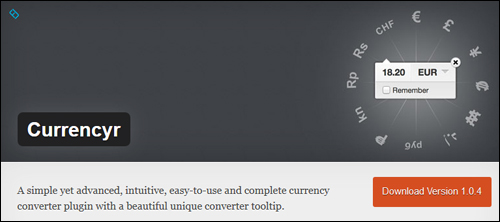
Currencyr is a simple yet advanced, intuitive, easy-to-use and complete currency converter plugin with a beautiful and unique converter tooltip. Best of all, it’s free!
Great plugin features include the following:
- In-line conversion tool
- Supports several exchange rates providers, such as Yahoo!, Google, Open Exchange Rates, European Central Bank and FoxRates
- WP-Cron task scheduler enabled
- Currency table and converter widget
- Can be integrated with a number of e-commerce plugins like WooCommerce, WP-eCommerce, Shopp, and Easy Digital Downloads.
- Can detect local currency automatically
- Support for language translations
Note: This plugin requires your server to be running PHP 5.3.0 or later. Do not install this plugin if you currently have an older version of PHP installed on your server. Ask your webhosting company to check and upgrade your PHP.
***
You can install the currency conversion plugin from your WordPress admin area by typing in “currencyr” into the Plugins search field and clicking the ”Install Now” button …
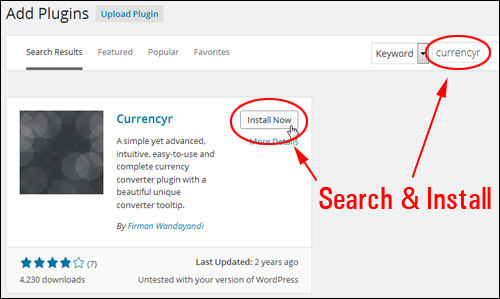
After installing and activating the plugin, you can access the plugin’s settings section by selecting Currencyr from your WP dashboard menu …
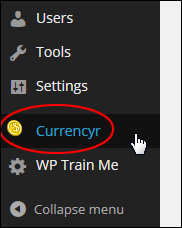
This takes you to the plugin settings screen …
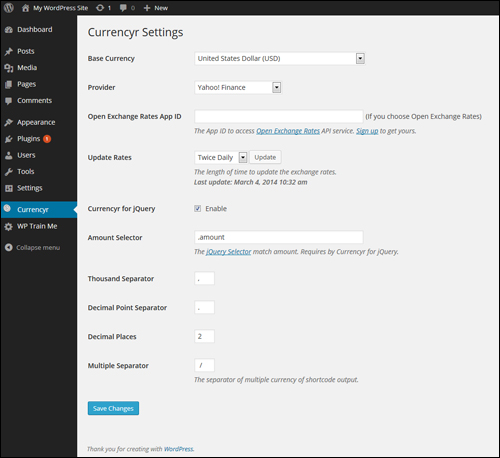
For example, you can select a base currency from the ‘Base Currency’ drop-down menu. The default base currency is ’USD’ …
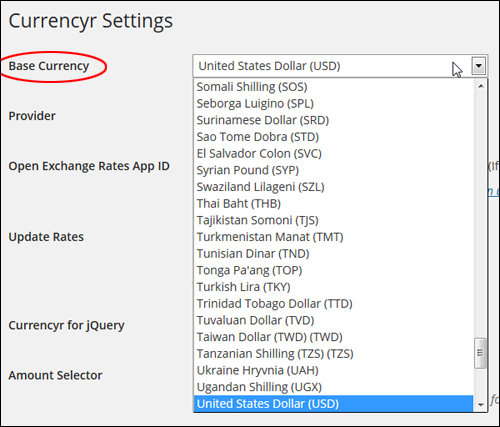
You can also specify which data provider you want to use from a drop-down menu. The default option is Yahoo Finance, but you can also choose one of the other options, such as FoxRate or Open Exchange Rates …

Note: If you select ‘Open Exchange Rates’ as your provider, you will need to obtain an API (Application Programming Interface) ID …

You can select how often you want the exchange rates to be updated by specifying an option from the ‘Update Rates’ drop-down menu …

The plugin uses jQuery, which is an open-source library of Javascript code that allows web developers to add things like animation effects to web applications (e.g. WP plugins).
Unless there is a reason to change the jQuery settings, you can just ignore this setting …

Edit the remainder of the settings and click Save Changes when done …
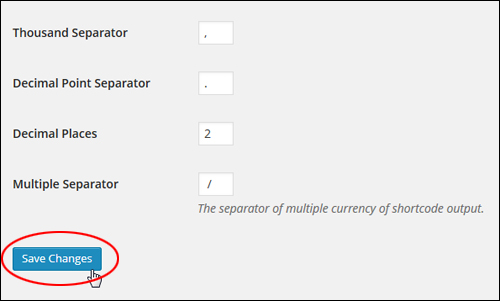
After your plugin settings have been configured, you can easily start adding currency conversion to any WordPress post or page using a shortcode.
See the ‘Additional Plugin Notes’ section below to learn more about using currency codes (e.g. USD, AUD, ZAR, etc …) with the Currencyr plugin.
Currencyr Shortcodes
You can add currency conversion to pages, posts and widgets with no coding knowledge or skills using shortcodes.
Let’s take a look at some examples of currency shortcodes that you can add to your WordPress pages and posts:
Let’s say that you are selling your products on your website for a fixed amount (e.g. $175) in US Dollars (USD), and you would also like to show this amount converted into British pounds (GBP) on your sales page.
All you need to do is insert the shortcode below to your page content …

Note: You can also insert amounts in dollars and cents (for example, 175.00, 97.00, 399.99, etc …)
The example below shows how your shortcode looks once you have inserted it into your page or post …
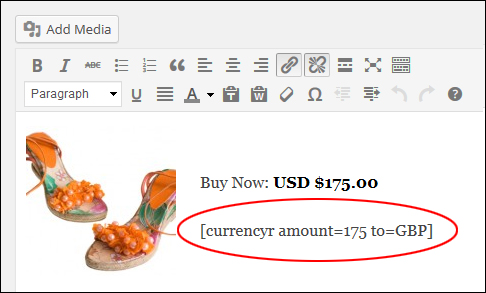
After publishing the page, your converted currency amount will display as you can see in the example below …
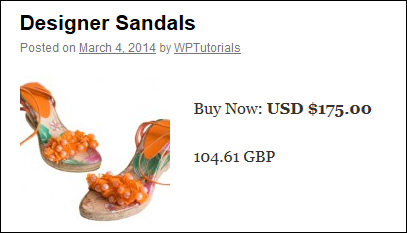
Using the same example, let’s now convert the same price into different currency formats.
To do this, use following shortcode (add as many currency symbols as you like by using vertical pipes) …

The example below now shows how the above shortcode appears when inserted into a page …

Once the content has been published, the converted currency will then display as seen below …
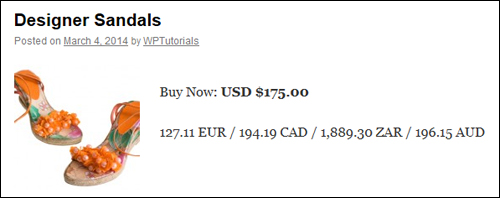
refer to the ‘Additional Plugin Notes’ section at the bottom of this tutorial to learn more about changing the currency separator symbol in the Currencyr plugin.
Now, let’s suppose that you want to use a different base currency than the one selected as your default.
For example, if you have specified your default base currency as EUR and you have a section on your site targeted to visitors in countries like Australia or Canada, you can change the base currency using the following shortcode …

The example below shows how the shortcode looks when added to your content …
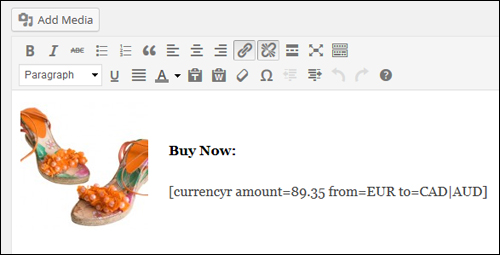
Once the page or post has been published, your currency conversion will then appear like this …
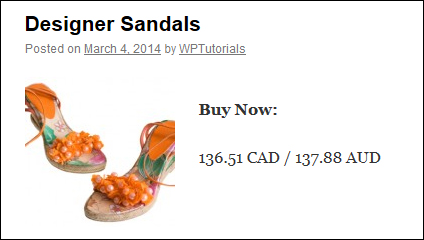
Using The Currencyr Widget
You can also add a currency converter to your website or blog’s sidebar using the plugin’s widget.
To add the currency converter to your sidebar, select Appearance > Widgets from your WordPress user admin menu …
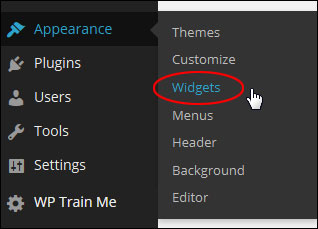
In the Widgets > Available Widgets area find the ‘Currencyr’ widget and drag it to the Active Widgets location …
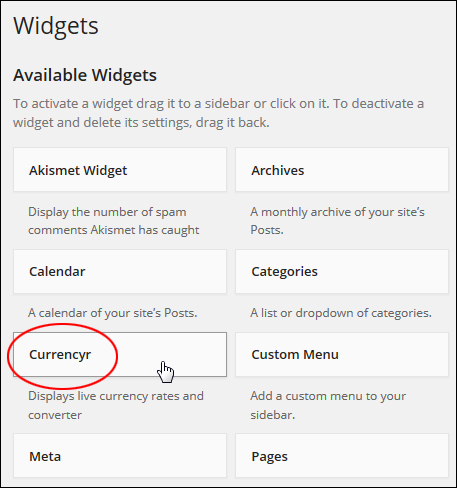
Configure the widget options as shown in the example below (add currency codes separated by commas), and click ‘Save’ to update your settings …
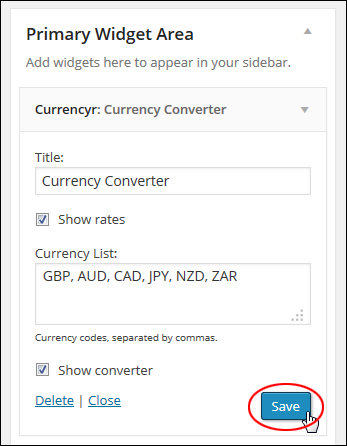
The currency converter tool will now appear on your website’s sidebar with the options you have specified …
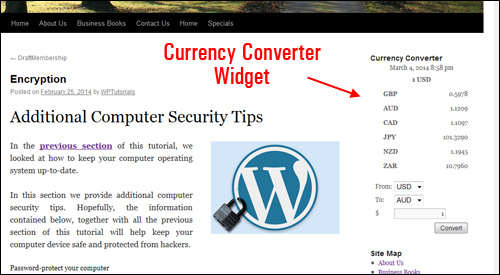
Additional Plugin Notes
This section contains additional information about using the Currencyr plugin.
Currency Separator
The Currencyr plugin allows you to specify the symbol to display as the currency separator when using multiple currencies.
You can change the symbol in the Multiple Separator settings field.
So, for example, entering the default symbol “/” (forward slash) …

Separates all your prices with a forward slash as you can see in the screenshot below …
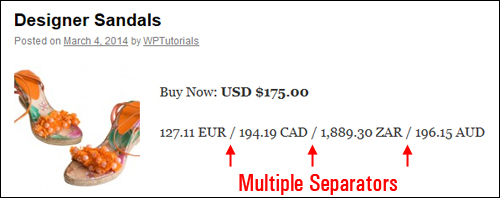
If you modify the symbol and update your settings …

Your web site visitors will see the new symbol being used as the currency separator …
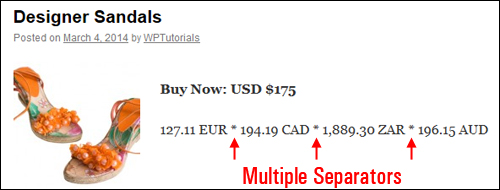
E-Commerce Integration
As described earlier, the plugin can be integrated with a number of WP-compatible e-commerce plugins like WooCommerce, Shopp and Easy Digital Downloads …
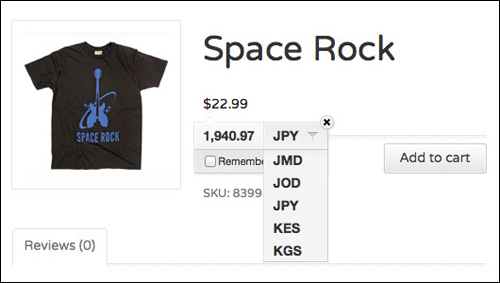
(image source: plugin website)
And there you have it! Now you can go and easily add currency conversion to your e-commerce website.
To learn more about WordPress e-commerce plugins, see the tutorial below:
***
"These tutorials have so much information and are easy to understand. If you use WordPress or plan to in the future these will help you with everything you need to know." - Valisa (Mesa, Arizona)